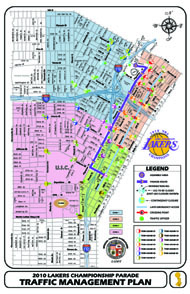Chief
Daryl F. Gates
As I and members of the Los Angeles Police Department’s Metropolitan
Division lay to rest Police Officer III+1 Robert J. Cottle at a ceremony
in Arlington National Cemetery on April 16th, I was notified of the
passing of Chief Daryl F. Gates. The 49th Chief of this great
organization, Gates devoted his life to this Department. During his
tenure as Chief, Daryl Gates was the LAPD, and the LAPD was Daryl
Gates.
On September 16, 1949, Gates was sworn in as a member of the Los Angeles
Police Department. On March 28, 1978, he was sworn in as the 49th
Chief of Police and would lead the LAPD for 14 years.
Gates was a Chief for his time, and it was a difficult time in American
policing. In LA, it was a thin blue line that policed the city. The
Chief shaped and formed many of the existing practices and policies of
the LAPD and community based programs which have been adapted and
implemented around the world.
He recognized the need for elite trained officers and paved the way for
the creation of SWAT. In his fight against the crack cocaine epidemic,
he put 10 police officers in fifty schools teaching fifth and sixth
grade students about the dangers of drug use. DARE would go on to be
taught in all 50 states and around the world.
Knowing the eyes of the world would be on Los Angeles for the 1984
summer Olympic Games; Chief Gates strategically deployed 2,300 officers,
helping to make the games a success.
It was his support for Baker to Vegas that also made the event
successful in its early years. An avid runner himself, Chief Gates had
hoped to be at this year’s run, but because of his declining health, it
wasn’t possible. The LAPD teams did however, have the support of the
Gates family and we appreciate them being there during a very difficult
time. I also want to thank and congratulate all of our runners on their
performances. The LAPD Metro Blue team was our first Department team
to cross the finish line amongst the many that participated. A very
special thank you as well to the families and friends of our runners and
to each of the support teams who worked hard to guide our runners
through the desert, over the mountains, and into Las Vegas.
The LAPD prides itself on its commitment to athletic competitions. Our
men and women who compete on LAPD teams spend a great deal of time and
effort to represent us well. Many of them will soon participate in the
upcoming Western State Police and Fire Games. The week long multi-sport
Olympic-style program will be held the last week of July in Reno,
Sparks, Tahoe and Truckee, Nevada. I thank each of them for
representing the LAPD, and I know they will have a great experience.
Please visit the LAPD Sports page on LAPDOnline.org for the latest
results from all the games.
Employee
Wellness
While sporting events and being a member of an athletic team may help to
keep you physically fit, and is an element of employee wellness, you
are also responsible for following policies that keep you safe. Sadly,
far too many of you are not wearing your seatbelts. And when involved
in a traffic collision, consequently, there are many of you suffering
more severe injuries because of it.
You make a conscious decision to compromise your personal safety and
violate Department policy when you choose not to buckle up. Remember,
it is statistically more likely for officers to be killed in a traffic
collision than in an officer involved shooting. While a majority of you
use your seatbelt, it is crucial that we achieve 100 percent
compliance.
I understand that from a tactical standpoint there may be some instances
where you may not always be able to buckle up, but I expect you to wear
your seatbelt when performing your usual day-to-day duties. Not only
is this an officer safety issue, but is also one of integrity. As law
enforcement professionals are granted the power to cite offenders of the
State’s seatbelt law, so must we lead by example.
Employee wellness also means finding healthy ways to cope with the
stresses that come with being a police officer, or working for the
Department as a civilian. Using alcohol to deal with job stress can
quickly lead to alcohol abuse and drinking and driving. Statistics from
2006-2008 revealed that on average, 21 Department employees, sworn and
civilian, are arrested each year for DUI. The decision to drive while
inebriated is a question of character and integrity. When consumption
of alcohol leads to abuse and dependence connected to psychological
concerns, the effects are seen and felt at home and the workplace. To
educate you about the dangers of alcohol use and driving while under the
influence, I require you to watch two separate roll call videos each
year that addresses the issue. It takes courage to get involved and to
confront a co-worker you think may have a problem, but speaks volumes of
one’s own character. We owe it to each other to step in and help one
another.
In addition, the Department’s Behavioral Science Services (BSS)
psychologists routinely reach out to Commanding Officers and supervisors
to educate them on the signs and symptoms of alcohol abuse and
dependence, causes and potential impacts of (excessive) use, the
connection to other psychological concerns (depression, suicide), and
how to intervene and make appropriate referrals to BSS.
While a DUI arrest may reflect purely bad judgment, the majority of the
individuals who are arrested while DUI already have significant stress
in their lives, in addition to the stress caused by the
arrest/detainment and in the worst case scenario, serious injury or loss
of life.
My message to you has been that cops count - character counts; do the
right thing and you can be the difference. As officers of the law, and
employees of the LAPD, you have a responsibility to hold yourself to a
higher standard. In order to enforce the law we must practice it. When
we break the same laws we enforce it undermines the trust and confidence
of the communities we serve.
Together We
Can
Again, I thank you for the personal emails I have received with your
suggestions and questions. As I continue to speak with many of you when
I work patrol once a month and through my monthly messages, I will
provide you with feedback on various projects in the works. Your
suggestions have not fallen on deaf ears, but please be patient as
change takes time. The following are some of your recommendations that
we are currently working on:
- Streamlining the RFC and Private Persons Arrest process;
- assessing the need to staff morning watch hours at geographic
areas’ station front desks;
- streamlining the jail process;
- elimination of “complained of injury” traffic reports; and
- creating a more responsive and timely process for issuing
awards, citations and commendations.
As training is another topic of discussion you bring to my attention,
let me provide an overview of some firearms and tactics training that
many of you have inquired about.
In my effort to keep you safe while working a black and white, Training
Division (TD) continues to offer improved and frequent training
opportunities. I am in full support of the Patrol Rifle expansion
program and Training Division has a goal to keep a minimum of 16 rifles
in each Area. It is no longer limited as to rank for who can carry a
Patrol Rifle. Please look on the LAN for detailed information about
upcoming classes.
This Fall TD will offer a semi-auto pistol transition school for those
who are interested in transitioning from a weapon without a de-cocking
lever to one with, such as an authorized Smith and Wesson or Beretta.
As you may already know MACTAC Basic continues weekly. We currently
have over 6,000 officers trained. We will soon be starting up the
MACTAC Team Leader course and next year we will begin to conduct MACTAC
field exercises. Additionally, LETAC continues to run three times each
Deployment Period. You can see your Training Coordinator for more
information.
Finally, each year your training coordinators are required to work with
TD to put on a perishable skills/firearms training day. My goal is to
provide you with quality training and the tools to keep you safe.
 LOS ANGELES
(June 18, 2025) — The City of Los Angeles Department of Transportation
(LADOT) has announced the closure of several streets in the Downtown
Convention Center area on Monday, June 21st. The Lakers’ Celebration
Parade, scheduled to begin at 11:00 AM at West 12th and South Figueroa
Streets, will proceed approximately two miles toward the USC campus
before turning east on Jefferson Boulevard and ending at Grand Ave.
LOS ANGELES
(June 18, 2025) — The City of Los Angeles Department of Transportation
(LADOT) has announced the closure of several streets in the Downtown
Convention Center area on Monday, June 21st. The Lakers’ Celebration
Parade, scheduled to begin at 11:00 AM at West 12th and South Figueroa
Streets, will proceed approximately two miles toward the USC campus
before turning east on Jefferson Boulevard and ending at Grand Ave.









Recent Comments